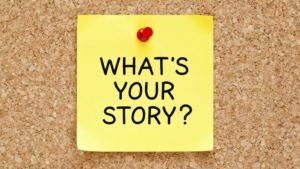What Are the Stories That Keep Moving You Forward?
 As a coach, I work in a profession that has as one of its primary goals, moving people forward into accomplishing what they may want next in their life. Additionally, as I get older myself, I see the continual change going on around me. Whether it is new construction replacing a business or building that I knew from another time in the neighborhood where I live, to the automation of processes that I did either manually or by using a service provider to whom I traveled, to even how are electronic devices often become our source of “entertainment,” change just keeps on coming.
As a coach, I work in a profession that has as one of its primary goals, moving people forward into accomplishing what they may want next in their life. Additionally, as I get older myself, I see the continual change going on around me. Whether it is new construction replacing a business or building that I knew from another time in the neighborhood where I live, to the automation of processes that I did either manually or by using a service provider to whom I traveled, to even how are electronic devices often become our source of “entertainment,” change just keeps on coming.
On the opposite end of the spectrum, I am an individual blessed with a great memory for recalling the details of the experiences I have had in my life. While some of those experiences may have had sad memories, many have extremely happy feelings that I still enjoy pondering on today. Some I may even get to relive, either by watching old family movies, or seeing a particular show I watched even 30 to 40 years ago as a clip on YouTube. While often one is counseled on not “living in the past.” I do feel that when your memories are good ones and provide you strength, they are actually a secret in helping to keep you young.
When I first was trained in the career coaching methods of “The Five O’Clock Club”, one of the assessment tools to which they introduced me, and one which I use with some of my job searchers today, is one called “The Seven Stories Exercise.” While the Five O’Clock Club trademarked it by that name, it actually was a tool that was used during the 1940’s to transition military personnel to civilian life.
The Seven Stories Exercise is built on the following premise. Even at this stage of your life, what drives you and what you enjoy doing, often has its roots in your past. You may not even realize that fact. For example, when I think back on it now, even though I became a coach long before I learned many of the principles of coaching that I use in my practice today, they helped moved me into my new chosen profession. For example, I always loved to listen to the stories of others. Many would come to me for guidance and advise, especially in the latter years of my corporate career. Additionally, I loved to assist with the development of strategies to address a problem or situation.
The Seven Stories Exercise is built on such premises. It says first of all think back on your life. Identify those times you feel you accomplished something in your life. The only qualifications in identifying it as an accomplishment is that you felt successful in completing it, and that you enjoyed doing it. One is encouraged to identify as many stories as possible, with a target of identifying 25 of them. (NOTE: If one was to stop short of 25 that is not a problem, although one should really strive to identify at least 15 of them). Again, this is not based on anyone else’s feeling of whether it was an accomplishment, just your own.
The Seven Stories Exercise then goes on to ask one to rank the accomplishments so they can identify those that are their Top 7, (with a distinct ranking of Number 1 through Number 7). they working One is then asked such questions as what were they doing in the story, what skills might they have been using, with whom were when accomplishing what they remember of the story. Once completed with that for each of the Top 7 stories identified, one is asked to note what were the common skills they used in each story. Often these are skills one is still using today in their everyday life, and enjoy using when they are feeling successful and moving forward with an activity they enjoy doing.
Yes, it is not ideal or wise to keep oneself completely stuck in the past. However, by the same token, that does not mean your past should be fully discarded, especially if you do have memories, talents and stories you enjoy from it. If you feel you are in a current rut, and seem to find a lack of enjoyment in the world going on around you, what items may you be able to bring forward from your past. Or minimally what activities may provide you the ability to use the skills and traits that you seem to always be using when you find a sense of accomplishment and enjoyment in what you do? The hints may just be there, if you give yourself the time to think them through for yourself.
